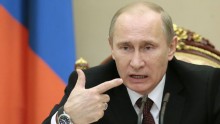The remake of “The Ten Days that Shook the World” began on March 6 and lasted as long as necessary. Putin had disappeared. In my view, it was an FSB operation masterminded by the vanished Kremlin occupant himself. But the world fell for the trick. Politicians, journalists, and political scientists began hazarding guesses – from incurable diseases to a face-off in the Russian president’s inner circle. This sounded particularly touching: today’s Putin 1 may be succeeded by a more bloodthirsty Putin 2, and we will be recalling Putin 1 as a liberal-minded landlord from a novel by Ivan Turgenev or Ivan Goncharov. Special services like to throw in this kind of messages to gauge public opinion, but still the destiny of PTN (“Putin”) continued to be of interest even to the conscientious part of the public for whom PTN seems to be closely linked to another Ukrainian abbreviation – PNKh (“F*** off!”).
I will dare say this has produced an effect. For what was the previous top news in Russia? Right, the assassination of Boris Nemtsov. The latest top news overshadowed the previous one. Who ranted about new sanctions, a “Nemtsov list” patterned after the “Magnitsky list”? So, where is this list?
In general, unexpected disappearances and the advent of a “deus ex machina,” who emerges on stage at the end of an antique tragedy and settles all the problems, is an old favorite ploy of Russian despots, including the spiritual mentors of the current one. Suffice it to recall a hasty retreat of Ivan the Terrible from Moscow to the village of Aleksandrovka on December 3, 1564, which sent Muscovites into turmoil and panic. But this allowed the tsar to come back a month later on his own conditions, including the right to have “traitors” hanged.
If you want to see through a magic trick, you must watch closely the magician’s hands. After all, it should be of no interest to us where Putin is, what Putin said (for he lies), or what Putin’s spokesman said (for he also lies). Let us follow his hands. In this connection, against the backdrop of a film on the anniversary of the occupation of Crimea, threats to Denmark, new war games, and provocations by Russian warplanes aimed at intimidating the world community, we almost failed to notice the Russian president’s decree of March 19 on the appointment of General of the Army Oleg Syromolotov, FSB deputy director in charge of counterterrorism, as Russia’s deputy foreign minister in charge of terrorism control. We were wrong to do so. Although it is an open secret that the Russian foreign ministry and security service are allied institutions that function by the principle of communicating vessels, the establishment of a high diplomatic office for a trusted and tested Syromolotov, who was spotted in the run-up to the Sochi Olympics as member of the board of directors of Russia’s most corrupt state-run corporation Olympstroi, seems to be a much more interesting event than Putin’s temporary disappearance. And it is not only from a retrospective angle because, according to Russian observers Andrei Soldatov and Irina Borogan, the Sochi Olympic Games “can fetch Russia first place in the competition in keeping athletes and fans under surveillance.” The activity range of the newly-appointed deputy minister can turn out to be extremely broad – from the attempts of rapprochement with the US, as was the case in 2001, on the grounds of fighting international terrorism, to the diplomatic cover of unconventional situations created on the territories of other states.
The civilized world must understand that what poses a threat to international security is not Putin or his successor but a country 90 percent of whose population supports Putin. And it is the right time now to switch pedestals. I once read a newspaper article by a circus trainer, which began with the words: “Have you ever noticed that lions and tigers always squirm, sitting on their pedestals?” I went to the circus and saw them really squirming. These gigantic cats turned out to be afraid of falling. Knowing this, specialists make circus pedestals of such a diameter that beasts always feel discomfort and squirm for fear of falling. For if they managed to settle themselves cozily, they would surely pounce on the trainer or on each other. I have been inclined to think lately that what will save the world is not beauty but an uncomfortable pedestal for Russia so that the latter never pounces on anybody.
Serhii Borshchevsky is an expert at the Center of Russian Studies








